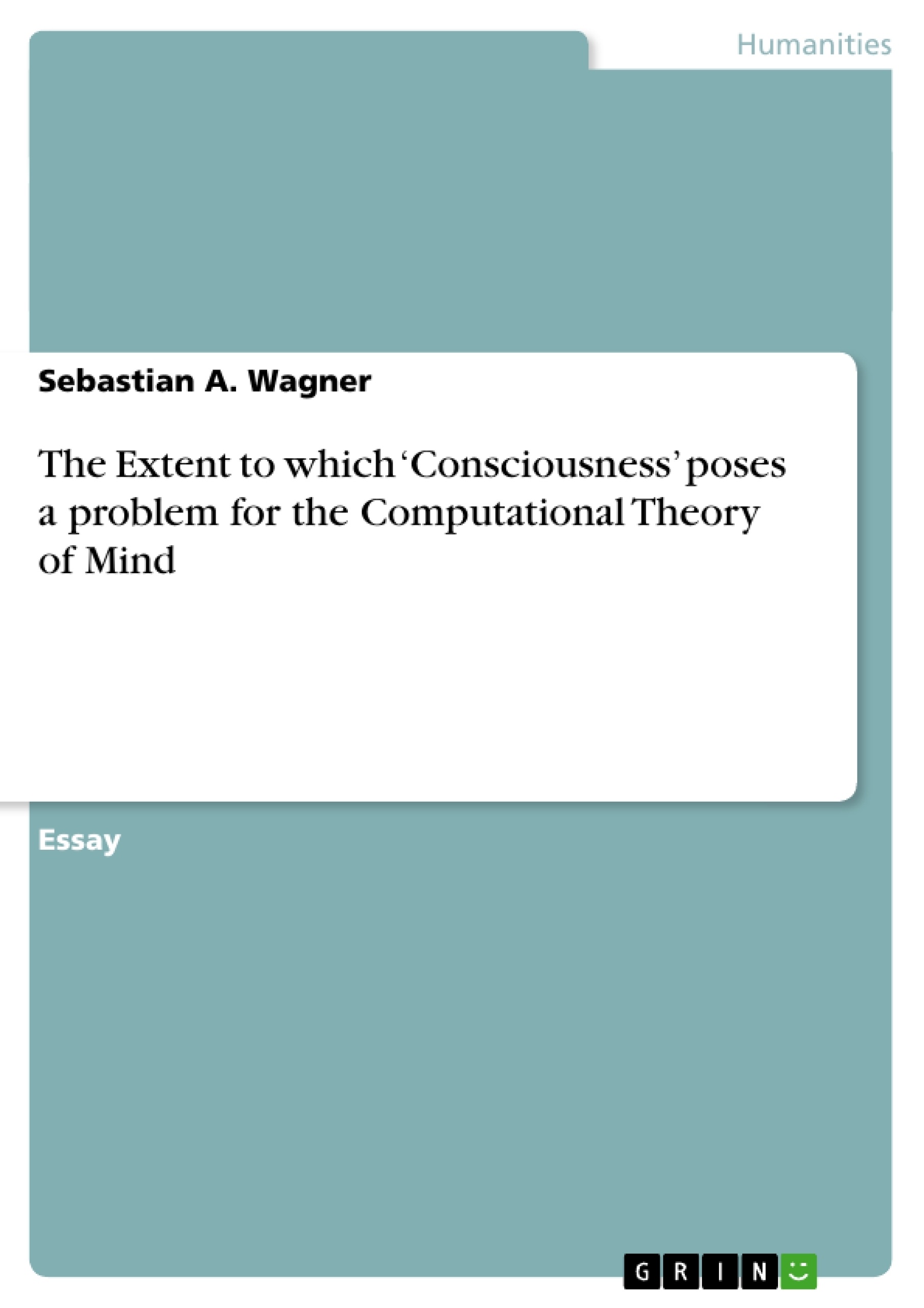In Psychology, many theories and models use process charts resembling circuit diagrams of technical devices. In this account, human behaviour and experience appears to be the result of processes taking place in the ‘black box’ named cognition. In this context, “computationalism is the view that computation […] can offer an explanatory basis for cognition” (Davenport, 2008, p.1). The Computational Theory of Mind (CTM) has developed on this foundation, attempting to reveal what is inside this ‘black box’. In contrast, human consciousness being a part of cognition (Harnad, 1994) seems to be beyond any scientific explanation. This essay will critically discuss the extent to which consciousness poses a problem for the CTM – regarding issues surrounding consciousness as an area of scientific study, the extent to which consciousness is explicable in computational terms, explanations of consciousness, and Dennett’s (1991) different account to consciousness. It will be argued that consciousness does pose a major problem for the CTM, especially when it is conceptualised as subjective experience. It will conclude that Cognitive Science should presently focus only on certain aspects of consciousness, called the easy problems.
Inhaltsverzeichnis (Table of Contents)
- The Extent to Which ‘Consciousness' Poses a Problem for the Computational Theory of Mind
- The Computational Theory of Mind
- Consciousness
- The Extent to which ‘consciousness' poses a problem for the CTM
- Explanations of Consciousness
- Dennett's (1991) Different Account to Consciousness
Zielsetzung und Themenschwerpunkte (Objectives and Key Themes)
This essay critically discusses the extent to which consciousness poses a problem for the Computational Theory of Mind (CTM). It explores issues surrounding consciousness as a scientific subject, the possibility of computationally explaining consciousness, different explanations of consciousness, and Dennett's (1991) alternative perspective on consciousness. The essay argues that consciousness, especially when viewed as subjective experience, poses a significant challenge to the CTM.
- The nature of consciousness as a scientific subject
- The feasibility of explaining consciousness through computational terms
- Different explanations of consciousness
- The challenges posed by consciousness to the CTM
- Dennett's alternative view on consciousness
Zusammenfassung der Kapitel (Chapter Summaries)
- The Computational Theory of Mind: This section introduces the Computational Theory of Mind (CTM), comparing the human mind to a digital computer, where cognition is seen as information processing. The CTM is presented as a potential answer to the fundamental question of how the mind works.
- Consciousness: This section addresses the challenges of defining and studying consciousness, highlighting the "epistemological problem" of knowing internal activities of conscious minds. The concept of qualia, or subjective experience, is introduced as a key aspect of consciousness.
- The Extent to which ‘consciousness' poses a problem for the CTM: This section explores Nagel's argument that subjective experience cannot be fully captured by scientific understanding, even with knowledge of the physical brain. This argument suggests that consciousness poses a significant problem for the CTM, as the latter aims to explain how the mind works, including subjective experience.
- Explanations of Consciousness: This section discusses different explanations of consciousness, including Access Consciousness (A-consciousness) and Phenomenal Consciousness (P-consciousness). It argues that P-consciousness, with its focus on qualia, is more difficult to explain than A-consciousness and presents a greater challenge to the CTM.
Schlüsselwörter (Keywords)
The primary terms and concepts discussed in this essay include: Computational Theory of Mind (CTM), consciousness, subjective experience, qualia, Access Consciousness (A-consciousness), Phenomenal Consciousness (P-consciousness), computation, information processing, dualism, materialism, and property dualism.
- Quote paper
- Dipl.-Psych. (Univ.) - B.Sc. (F.C. Hon.) in Psych. Sebastian A. Wagner (Author), 2008, The Extent to which ‘Consciousness’ poses a problem for the Computational Theory of Mind, Munich, GRIN Verlag, https://www.grin.com/document/170543



